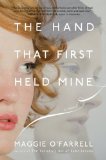Summary | Excerpt | Reading Guide | Reviews | Beyond the Book | Readalikes | Genres & Themes | Author Bio

A Novel
by Maggie O'FarrellExcerpt
The Hand That First Held Mine
Listen. The trees in this story are stirring, trembling, readjusting
themselves. A breeze is coming in gusts off the sea, and it is
almost as if the trees know, in their restlessness, in their head-tossing
impatience, that something is about to happen.
The garden is empty, the patio deserted, save for some pots with
geraniums and delphiniums shuddering in the wind. A bench stands
on the lawn, two chairs facing politely away from it. A bicycle is
propped up against the house but its pedals are stationary, the oiled
chain motionless. A baby has been put out to sleep in a pram and it
lies inside its stiff cocoon of blankets, eyes obligingly shut tight. A
seagull hangs suspended in the sky above and even that is silent,
beak closed, wings outstretched to catch the high thermal draughts.
The house is set apart from the rest of the village, behind dense
hedge, on the crest of a cliff. This is the border between Devon and
Cornwall, where the two counties crouch, eyeing each other. It is a
much-disputed piece of land. It would not do to look too long at
the soil here, soaked as it will be with the blood of Celts, Anglo-
Saxons, Romans, filled out with the rubble of their bones.
However, this happens in a time of relative peace for Britain: late
summer in the mid-1950s. A gravelled path curves towards the front
door of the house. On the washing-line, petticoats and vests, socks
and stays, nappies and handkerchiefs snap and writhe in the breeze.
A radio can be heard from somewhere, one of the neighbouring
houses perhaps, and the muffled thwack of an axe falling on wood.
The garden waits. The trees wait. The seagull, balancing in the
sky above the washing, waits. And then, just as if this is a stage set
and there is an audience, watching from a hushed dark, there are
voices. Noises off. Somebody screams, another person shouts, something
heavy hits the floor. The back door of the house is wrenched
open. ‘I can’t bear it! I tell you, I can’t!’ the someone shrieks. The
back door is slammed, resoundingly, and a person appears.
She is twenty-one, soon to be twenty-two. She is wearing a blue
cotton dress with red buttons. A yellow scarf holds back her hair.
She is marching across the patio and she is holding a book. In her
bare feet, she stamps down the steps and across the lawn. She doesn’t
notice the seagull, which has turned in the air to look down on her,
she doesn’t notice the trees, which are tossing their branches to herald
her arrival, she doesn’t even notice the baby as she sweeps past the
pram, heading for a tree stump at the bottom of the garden.
She sits herself down on this tree stump and, attempting to ignore
the rage fanning through her veins, she balances the book on her
lap and begins to read. Death be not proud, the words begin, though some
have called thee Mighty and dreadful.
She bends with tense concentration over the page, sighing and
flexing her shoulders. Then, without warning, she lets out a sudden
growl and flings the book away from her. It hits the grass with a
subdued thud, its pages fluttering closed. There it lies, surrounded
by grass.
She gets to her feet. She doesn’t do it as anybody else would,
gradually moving from sitting to standing. She leaps, she starts, she
bounds, she seems to stamp on the soil as she rises as if, like
Rumpelstiltskin, she would crack it open.
Standing, she is at once confronted by the sight of a farmer in
the lane, driving a flock of sheep, a switch in one hand, a dog darting
about him. These sheep encapsulate what she hates about her home:
their shredded, filthy backsides, their numb-faced stupidity, their
witless bleating. She would like to drive them all into a threshing
machine, over the cliff, anything, just to rid herself of the sight.
She turns away from the sheep, away from the house. She keeps
only the sea in her sights. She has had a creeping fear of late that
what she wants most - for her life to begin, to take on some meaning,
to turn from blurred monochrome into glorious technicolour - may
pass her by. That she might not recognise it if it comes her way,
might fail to grasp for it.
Excerpted from Hand that First Held Mine by Maggie O'Farrell. Copyright © 2010 by Maggie O'Farrell. Excerpted by permission of Houghton Mifflin. All rights reserved. No part of this excerpt may be reproduced or reprinted without permission in writing from the publisher.
Your guide toexceptional books
BookBrowse seeks out and recommends the best in contemporary fiction and nonfiction—books that not only engage and entertain but also deepen our understanding of ourselves and the world around us.